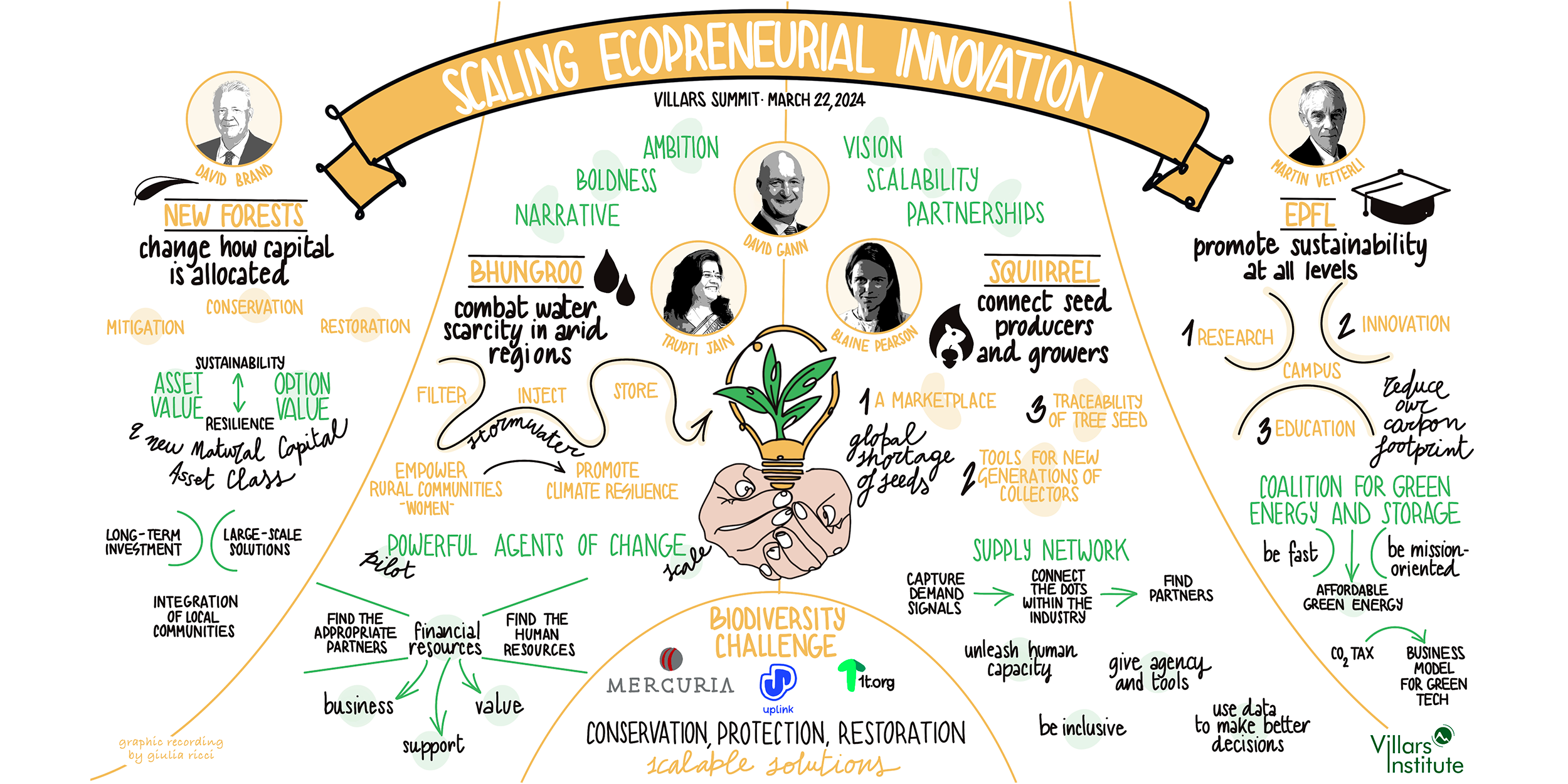The Ideas
Global concerns surrounding climate change and environmental sustainability have reached a critical juncture, where innovation is imperative for finding solutions. This set of experts delved into ecopreneurial innovation, offering their unique perspectives.
A platform for a financial model was proposed, that allows individuals to invest in climate-related projects, with verified integrity via resource tracking. This model was just recently launched and is already in use. For instance, local coffee shops track the origin of the coffee beans to assemble user transparency fortifying the relationship between the customer and store. Additionally, the platform aims to support local farmers to find demand for their produce ensuring farming capabilities are maximized.
Another entrepreneurial innovation called Bhungroo was presented. This technology leverages the excess water during the monsoon season in India in a way that provides year-round irrigation in arid regions. The Bhungroo technology tackles water storage challenges faced by small farms, particularly affordability and environmental impact. It is also noteworthy that it is enforced by a group of women. Overall, the technology aspires to harness the weather constraints to create full food security and empower women in local Indian communities.
From farmers to individuals, almost anyone can have an impact. Today there is a global shortage of seeds. One of the experts shared their newfound passion and expertise in seed collection. The truth is, we spend little time considering the vast potential of seeds, despite their vitality in nature restoration. The scaling of local seed collectors entails creating a market where small-scale seed collectors provide seeds for farmers. Pilot programs are taking place in Canada and the United States which match demand with retrospective collectors. Undoubtedly the demand for these seeds is high, so these programs show great promise.
Finally, the promotion of sustainability and green energy in academia was discussed, specifically taking a deep dive into initiatives at the Swiss Federal Institute of Technology Lausanne (EPFL), such as one meatless day per week, or integrated learning about sustainability. Furthermore, there was strong advocation for a worldwide CO2 tax as a way to incentivize more startups to work on sustainability.
Overall the experts underscore the pressing need for concerted action when fighting against climate change. Their insights elaborated on investment platforms, agricultural solutions, restoration efforts, and the promotion of sustainability. By employing renewable energy initiatives we can forge a path toward a more resilient and thriving planet across all sectors.
The Perspectives
In the intricate landscape of business and policy, effective mobilization of resources and ideas is crucial. Investors, with a keen eye on scalability and accuracy, seek ventures promising profitability surpassing losses. This often translates to an emphasis on rapid growth to attract substantial investments. To establish robust supply chains, a meticulous approach is required, starting with a thorough understanding of demand dynamics. Unifying demand signals into a cohesive system is pivotal for ensuring market satisfaction and fostering growth. Companies like Squire, initially ambiguous in their role, now exemplify the evolving challenges within this domain. However, the scope of the challenge at hand is often underestimated. International investments aren't merely rights but privileges, demanding meticulous step-by-step progress. Take, for instance, a company's expansion in Tasmania—a seemingly straightforward move facilitated by spare time and access to banking facilities.
While investors advocate for patient capital and permanent assets, disparities in investments between AI and climate-related initiatives raise questions about investment priorities and systemic barriers. The perennial topic of access to markets remains, yet there is a growing realization of the need to create markets where none exist. Universities, serving as neutral testing grounds, play a pivotal role in technological advancements, fostering systemic thinking and long-term planning. Nevertheless, the conundrum of managing common resources persists, exacerbated by profit-driven motives that often prioritize financial gains over environmental considerations. Inclusivity, both within the scientific community and society at large, is crucial for fostering holistic solutions.
Indigenous technologies, particularly those empowering women, hold immense promise for addressing climate challenges. These innovations, scalable and adaptable, underscore the importance of local resources and community engagement. Seed collection initiatives exemplify intergenerational and intercultural efforts to preserve biodiversity. By tracing seeds to their source identity, initiatives like assisted migration gain traction, facilitating ecosystem restoration efforts. The role of data in informing decision-making cannot be overstated. Platforms like Squirrel filter demand signals, enabling stakeholders to make informed choices and drive industry-wide transformation.
The Coalition for Green Energy and Storage (CGES) embodies the collaborative ethos necessary for effecting systemic change. With a mission-oriented approach and a focus on delivering tangible results, initiatives like CGES strive to bridge the gap between policy aspirations and market realities. Ultimately, the success of these endeavors hinges on aligning financial returns with environmental imperatives. Only by incentivizing sustainable practices and advocating for policy reforms can we navigate towards a greener, more equitable future.



